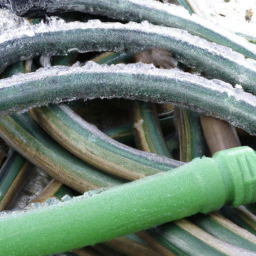How To Keep Garden Hose From Freezing
Table of Contents []
How To Keep Garden Hose From Freezing
Introduction
Gardening is a great way to get in touch with nature and is a fantastic hobby to get into but nothing ruins a budding gardener's mood faster than discovering their garden hose is frozen solid. Fortunately, there are methods to keep garden hose from freezing.
Threads
This article will guide you through the following eight topics:
What Causes Garden Hose to Freeze?
Regular Store-Bought Solutions
Home Remedies
Lay the Hose Out
Drain and Store the Hose
Insulate Pipes and Wall Outlets
Store the Hose Indoors
Warming the Hose
What Causes Garden Hose to Freeze?
Garden hoses are meant to be out in weather, whether that's warm summer days or cold winter nights, so it's exact causes of a frozen garden hose may not always be obvious.
Generally, it's because of moisture trapped inside the hose. Moisture on the outside of the hose can quickly freeze and expand, blocking the flow of water. When left in cold temperatures, the water inside the hose will freeze as well.
Regular Store-Bought Solutions
There are many store-bought solutions available for winter weather garden hoses. This includes solutions such as winterizing sprays, specifically made freeze solutions, and specific hose jackets.
Winterizing sprays are typically used by spraying the entire hose with the solution, and talc-based solutions are used for hoses that are already frozen and need to be thawed.
Home Remedies
Make a mixture of two parts white vinegar and one part water and fill the garden hose with it. Vinegar helps to keep water from freezing as quickly as regular water. Portable heaters are also a great way to keep the water warm for the hose.
Lay the Hose Out
It's best to lay the hose out in an S-shape however make sure there's no tension on the hose as this could damage the integrity of the structure. This stance can also help to prevent future freezing.
Drain and Store The Hose
It's important to remember to drain the garden hose and store it away in a safe place. If the hose isn't completely dry, bacteria and mildew can form.
Insulate Pipes and Wall Outlets
Make sure the pipes and wall outlets are insulated as well. This will help prevent condensation from collecting in the pipes and ultimately freeze it.
Store The Hose Indoors
Keeping the garden hose indoors is the best way to prevent freezing. Make sure the garden hose is completely dry before storing it to prevent it from getting mouldy.
Warming the Hose
If the hose does get frozen, warming the hose up is the best idea. This can be done with portable electric heaters or hair dryers. It's important to make sure the heaters or hairdryers are not too hot as this could damage the structure of the hose.
In summary
Garden hoses can be damaged from freezing temperatures. Taking preventative steps such as lay the hose out in an S-shape, drain and store the hose, insulating pipes and wall outlets, storing the hose indoors, and warming the hose up when frozen are the best solutions to prevent the garden hose from freezing.

Previous Page
